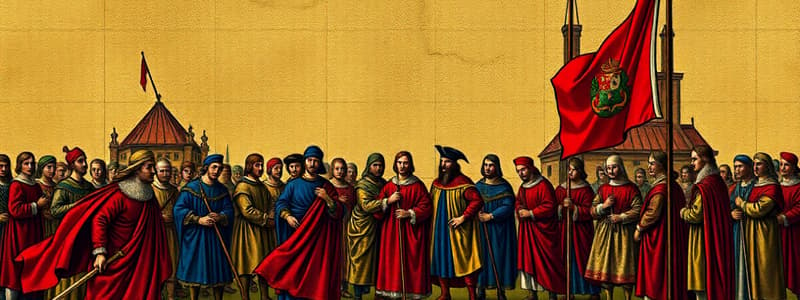Podcast
Questions and Answers
What does internal sovereignty refer to?
What does internal sovereignty refer to?
- A state's dependence on international organizations
- A state's ability to intervene in other countries' matters
- A state's recognition by the international community
- A state's supreme power within its territory (correct)
Why has the idea of absolute state sovereignty been questioned since the 1960s?
Why has the idea of absolute state sovereignty been questioned since the 1960s?
- Stringent laws regulating state governance
- The effects of globalization and humanitarian interventions (correct)
- The rise of non-state actors
- Increased military conflicts globally
What demonstrates external sovereignty?
What demonstrates external sovereignty?
- A state being recognized as an equal by the United Nations (correct)
- A state receiving aid from international organizations
- A state enforcing laws independently without foreign interference
- A state's ability to change its borders unilaterally
What role has globalization played in state sovereignty?
What role has globalization played in state sovereignty?
What aspect of sovereignty is challenged by the European Union's integration process?
What aspect of sovereignty is challenged by the European Union's integration process?
What do poststructuralists argue regarding state sovereignty?
What do poststructuralists argue regarding state sovereignty?
Humanitarian interventions have become more common due to which of the following factors?
Humanitarian interventions have become more common due to which of the following factors?
What principle is violated if one country tries to change the government of another by force?
What principle is violated if one country tries to change the government of another by force?
What principle allows each state to make its own decisions independently after the Peace of Westphalia?
What principle allows each state to make its own decisions independently after the Peace of Westphalia?
Which of the following best represents legal equality among states as influenced by the Peace of Westphalia?
Which of the following best represents legal equality among states as influenced by the Peace of Westphalia?
Which concept describes the influence of powerful non-state groups on global politics?
Which concept describes the influence of powerful non-state groups on global politics?
What is a potential negative effect of globalization described in the content?
What is a potential negative effect of globalization described in the content?
Which of the following illustrates the difference between cosmopolitan and parochial perspectives?
Which of the following illustrates the difference between cosmopolitan and parochial perspectives?
What aspect of global governance is exemplified by the United Nations addressing issues like climate change?
What aspect of global governance is exemplified by the United Nations addressing issues like climate change?
What change occurred in the school analogy representing countries after the Peace of Westphalia?
What change occurred in the school analogy representing countries after the Peace of Westphalia?
Which of the following does NOT represent the concept of non-state actors?
Which of the following does NOT represent the concept of non-state actors?
What was a significant impact of the Reformation on European society?
What was a significant impact of the Reformation on European society?
Which model of the universe did Galileo support through his work during the Scientific Revolution?
Which model of the universe did Galileo support through his work during the Scientific Revolution?
What was a key feature of the Enlightenment movement?
What was a key feature of the Enlightenment movement?
How did the Scientific Revolution influence society's view on nature?
How did the Scientific Revolution influence society's view on nature?
What conclusion can be drawn about the impact of the Reformation on state sovereignty?
What conclusion can be drawn about the impact of the Reformation on state sovereignty?
In the context of the Enlightenment, what was a criticism of traditional authority?
In the context of the Enlightenment, what was a criticism of traditional authority?
How did the Catholic Church’s role change during the 16th century due to internal issues?
How did the Catholic Church’s role change during the 16th century due to internal issues?
Which scientist formulated the laws of motion and universal gravitation, thus completing the Scientific Revolution?
Which scientist formulated the laws of motion and universal gravitation, thus completing the Scientific Revolution?
Flashcards are hidden until you start studying
Study Notes
The Peace of Westphalia
- The Peace of Westphalia (1648) marked a shift in power from a centralized religious authority to individual states.
- Before the Peace of Westphalia, a central religious authority had control over all states.
- After the Peace of Westphalia, states gained the power to make their own decisions, as long as they respected the rights of other states.
- The Peace of Westphalia introduced the ideas of state sovereignty and legal equality among states.
The Spread of Westphalian Principles
- The principles of the Peace of Westphalia, including state sovereignty and legal equality, have influenced global politics for over 350 years.
- The influence of Westphalian principles has extended beyond Europe.
- The ideas of state sovereignty and legal equality continue to shape the international system.
Globalization and Fragmentation
- Globalization involves the interconnectedness of people, goods, and ideas across borders.
- Globalization has led to increased global trade and interconnectedness.
- Fragmentation refers to forces that pull people apart, such as regional conflicts or cultural differences.
- Fragmentation can lead to a decrease in global cooperation.
Cosmopolitan vs. Parochial
- Cosmopolitanism involves being open to different cultures and ideas.
- A cosmopolitan worldview embraces diversity and interconnectedness.
- Parochialism involves focusing on local or narrow interests.
- Parochialism can contribute to social and political divisions.
Non-State Actors
- Non-State Actors are powerful groups that operate independently of national governments.
- Multinational corporations and Non-Governmental Organizations (NGOs) are examples of non-state actors.
- Non-state actors exert influence on global politics and economics.
Transnational Governance
- Transnational governance involves organizations working across borders to address global issues.
- The United Nations (UN) is an example of a transnational organization with a wide range of responsibilities.
- Transnational governance plays a crucial role in addressing global challenges like climate change.
Sovereignty: The Basics
- Sovereignty refers to the ultimate authority of a state within its borders.
- Internal sovereignty involves a state’s exclusive control within its territory.
- External sovereignty means that a state is recognized as an equal member of the international community.
- States are expected to respect each other’s internal sovereignty and refrain from interfering in each other’s affairs.
Changes in Sovereignty over Time
- The concept of absolute sovereignty has been challenged since the 1960s.
- Globalization, humanitarian interventions, and the end of the Cold War have all contributed to a shift in the understanding of sovereignty.
The European Union (EU)
- The EU's integration process has led to shared sovereignty among member states.
- EU members share sovereignty in areas like trade, immigration, and environmental regulation.
1960s Onwards
- Globalization has led to greater interconnectedness and influenced local economies and policies.
- Humanitarian interventions have raised questions about the limits of sovereignty.
Post-Structuralist View
- Post-structuralists argue that traditional concepts of sovereignty are outdated.
- They contend that the boundaries of state control are no longer as clear-cut as in the Westphalian era.
The Reformation
- The Reformation was a 16th-century religious movement that challenged the authority of the Catholic Church.
- The Reformation led to the rise of Protestantism and sparked religious and political conflicts in Europe.
- The Reformation contributed to the shift from a unified religious society to one with diverse regional interests.
The Catholic Church in the 16th Century
- The Catholic Church held a dominant position in Western Europe during the 16th century.
- The Catholic Church played a significant role in preserving classical culture.
Scientific Revolution
- The Scientific Revolution (16th-18th centuries) was a period of major scientific advancements that transformed societal and natural views.
- The Scientific Revolution emerged during the Renaissance.
- The Scientific Revolution challenged traditional understandings of the universe and the role of human reason.
Key Phases and Figures
- The Scientific Renaissance focused on rediscovering ancient knowledge.
- Galileo challenged the geocentric model and supported the heliocentric model.
- Isaac Newton’s “Principia” formulated the laws of motion and gravitation, completing the Scientific Revolution.
The Enlightenment
- The Enlightenment (1620s-1780s) emphasized reason, analysis, and individualism.
- The Enlightenment challenged traditional authority.
- The Enlightenment led to significant societal and political changes.
Studying That Suits You
Use AI to generate personalized quizzes and flashcards to suit your learning preferences.




